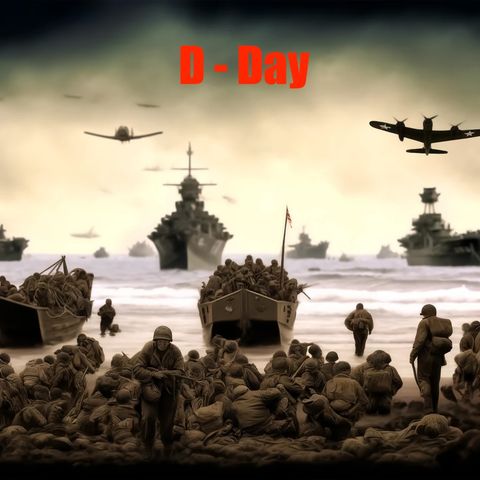The Aftermath and Legacy of D-Day

Download and listen anywhere
Download your favorite episodes and enjoy them, wherever you are! Sign up or log in now to access offline listening.
The Aftermath and Legacy of D-Day
This is an automatically generated transcript. Please note that complete accuracy is not guaranteed.
Description
The Aftermath and Legacy of D-Day The Normandy landings on June 6, 1944, marked a turning point in World War II, setting the stage for the liberation of Western Europe...
show moreOn a strategic level, the success of D-Day and the Normandy campaign dealt a severe blow to the German war machine and hastened the end of the war in Europe. The opening of a new front in Western Europe also relieved pressure on the Soviet Union, which had been bearing the brunt of the fighting against Germany since 1941. The Allies' success in Normandy demonstrated the effectiveness of combined arms warfare and the importance of air and naval superiority in modern conflict. The D-Day landings also had significant political and social implications. The liberation of France and the rest of Western Europe from Nazi occupation helped to restore the balance of power in Europe and set the stage for the postwar division of the continent between the Western Allies and the Soviet Union. The experience of liberation and the memory of the Allied sacrifice also played a crucial role in shaping the postwar identity of France and other European nations. In the United States, the D-Day landings and the broader Normandy campaign became a symbol of American heroism, sacrifice, and commitment to the cause of freedom. The bravery and determination of the American soldiers who fought in Normandy helped to cement the United States' status as a global superpower and a defender of democracy and human rights. The legacy of D-Day is also reflected in the numerous memorials, museums, and commemorative events that have been established in the years since the invasion. The Normandy American Cemetery and Memorial, which overlooks Omaha Beach, is a powerful tribute to the American soldiers who gave their lives in the D-Day landings and the subsequent campaign to liberate Europe. The memorial, with its rows of white crosses and Stars of David, serves as a poignant reminder of the human cost of the war and the enduring significance of the Allied victory. Other memorials, such as the Pointe du Hoc Ranger Monument and the Utah Beach Memorial, pay tribute to the specific units and individuals who played key roles in the D-Day landings. These memorials, along with the many museums and visitor centers that have been established in Normandy, help to preserve the memory of D-Day and educate future generations about the significance of the invasion and its aftermath. The legacy of D-Day is also reflected in the enduring alliances and partnerships that were forged between the United States, the United Kingdom, Canada, and other Allied nations during the war. The shared experience of the Normandy campaign and the broader struggle against Nazi Germany helped to strengthen the bonds between these nations and lay the foundation for the postwar international order.
Today, the legacy of D-Day continues to inspire and inform our understanding of World War II and its impact on the modern world. The bravery, sacrifice, and determination of the Allied forces who fought in Normandy remind us of the high cost of freedom and the importance of standing together in the face of tyranny and oppression. As we look back on the events of June 6, 1944, and the subsequent campaign to liberate Western Europe, we are reminded of the enduring significance of D-Day and its place in the annals of history. The success of the Normandy landings was a testament to the skill, courage, and resolve of the Allied forces, and a turning point in the war against Nazi Germany. The aftermath of D-Day and its long-term legacy continue to shape our world in countless ways, from the enduring alliances and partnerships between nations to the ongoing struggle for freedom and democracy around the globe. As we remember and honor the sacrifices of those who fought and died on the beaches of Normandy, we are reminded of the power of collective action and the importance of standing together in defense of our shared values and ideals. The legacy of D-Day is a testament to the resilience of the human spirit and the enduring power of hope and courage in the face of adversity. It is a reminder that even in the darkest of times, the forces of good can prevail, and that the sacrifices of the few can help to secure the freedom and prosperity of the many. As we look to the future, it is our responsibility to carry forward the legacy of D-Day and to honor the memory of those who fought and died for the Allied cause. By remembering their sacrifices and embracing their values of courage, selflessness, and determination, we can help to build a world that is more just, more peaceful, and more
Information
Copyright 2024 - Spreaker Inc. an iHeartMedia Company

Comments